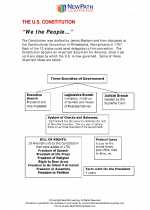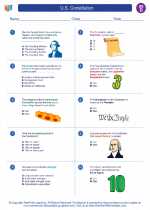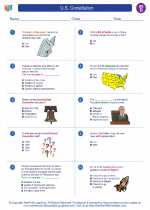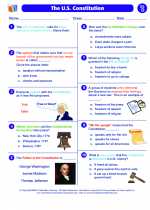National Curriculum Standards for Social Studies (NCSS)
POWER, AUTHORITY, AND GOVERNANCE
SOCIAL STUDIES PROGRAMS SHOULD INCLUDE EXPERIENCES THAT PROVIDE FOR THE STUDY OF HOW PEOPLE CREATE, INTERACT WITH, AND CHANGE STRUCTURES OF POWER, AUTHORITY, AND GOVERNANCE.
KNOWLEDGE - Learners will understand:
Fundamental ideas that are the foundation of American constitutional democracy, including those of the U.S. Constitution, the rule of law, separation of powers, checks and balances, minority rights, and the separation of church and state.
Fundamental values of democracy: the common good, liberty, justice, equality, and individual dignity.
The basic elements of government in the United States: executive, legislative, and judicial authority.
CIVIC IDEALS AND PRACTICES
SOCIAL STUDIES PROGRAMS SHOULD INCLUDE EXPERIENCES THAT PROVIDE FOR THE STUDY OF THE IDEALS, PRINCIPLES, AND PRACTICES OF CITIZENSHIP IN A DEMOCRATIC REPUBLIC.
KNOWLEDGE - Learners will understand:
Concepts and ideals such as: individual dignity, fairness, freedom, the common good, rule of law, civic life, rights, and responsibilities.
Democratic ideals and practices are often represented in excerpts from contemporary and historical sources, quotations, and stories.
National Standards for Civics and Government (NSCG)
What is Government and What Should It Do? What is government?
Defining government: Students should be able to provide a basic description of government. To achieve this standard, students should be able to
Describe government in terms of the people and groups who make, apply, and enforce rules and laws for others in their family, school, community, and nation and who manage disputes about them, e.g.,
Courts at all levels apply laws, manage disputes, and punish lawbreakers
What is Government and What Should It Do? What are the purposes of rules and laws?
Purposes of rules and laws: Students should be able to explain the purposes of rules and laws and why they are important in their classroom, school, community, state, and nation. To achieve this standard, students should be able to explain that rules and laws can be used to
Describe ways people should behave, e.g., attend school and do homework, raise one’s hand and be recognized before speaking in class, respect other peoples’ privacy and property
Protect rights, e.g., laws that protect people’s right to practice whatever religion they wish to, laws that provide equal opportunities for all students to get a free, public education
Assign burdens or responsibilities, e.g., laws that require people to pay taxes or to perform military service in times of national emergency
What is Government and What Should It Do? What are the differences between limited and unlimited governments?
Limited and unlimited governments: Students should be able to explain the basic differences between limited and unlimited governments. To achieve this standard, students should be able to
Give examples of laws that limit the power of people in government, e.g.,
Laws that prohibit governments from discriminating against people because of their religious or political beliefs
What is Government and What Should It Do? Why is it important to limit the power of government?
Importance of limited government: Students should be able to explain why limiting the power of government is important to their own lives. To achieve this standard, students should be able to
Explain why limited government is important for the protection of individual rights such as
Personal rights to practice the religion of their choice
Political rights to express their opinions
What are the Basic Values and Principles of American Democracy? What are the most important values and principles of American democracy?
Fundamental values and principles: Students should be able to explain the importance of the fundamental values and principles of American democracy. To achieve this standard, students should be able to
Identify fundamental values and principles as they are expressed in the Declaration of Independence, Preamble to the United States Constitution, the Bill of Rights, Pledge of Allegiance, speeches, songs, and stories
What are the Basic Values and Principles of American Democracy? What are some important beliefs Americans have about themselves and their government?
Distinctive characteristics of American society: Students should be able to identify some important beliefs commonly held by Americans about themselves and their government. To achieve this standard, students should be able to describe the following beliefs commonly held by Americans:
Importance of the individual: Students should be able to explain that Americans believe
Individuals have the right to differ about politics, religion, or any other matter
Individuals have the right to express their views without fear of being punished by their peers or their government
What are the Basic Values and Principles of American Democracy? Why is it important for Americans to share certain values, principles, and beliefs?
American identity: Students should be able to explain the importance of Americans sharing and supporting certain values, principles, and beliefs. To achieve this standard, students should be able to
Explain that Americans are united by the values, principles, and beliefs they share rather than by ethnicity, race, religion, class, language, gender, or national origin
Explain the importance of shared values, principles, and beliefs to the continuation and improvement of American democracy
Identify basic documents that set forth shared values, principles, and beliefs, e.g., Declaration of Independence, United States Constitution and Bill of Rights, Pledge of Allegiance
How Does the Government Established by the Constitution Embody the Purposes, Values, and Principles of American Democracy? What is the United States Constitution and why is it important?
The meaning and importance of the United States Constitution: Students should be able to describe what the United States Constitution is and why it is important. To achieve this standard, students should be able to explain that the United States Constitution
Is a written document that
Describes how the government is organized
Limits the powers of government by saying what government can and cannot do
Was created by people who believed that the
The people have the right to choose their representatives
The people have the right to change their government and the United States Constitution
How Does the Government Established by the Constitution Embody the Purposes, Values, and Principles of American Democracy? What does the national government do and how does it protect individual rights and promote the common good?
Organization and major responsibilities of the national government: Students should be able to give examples of ways the national government protects individual rights and promotes the common good. To achieve this standard, students should be able to explain that
Congress passes laws to
Protect individual rights, e.g., laws protecting freedom of religion and expression and preventing unfair discrimination
The judicial branch, headed by the Supreme Court, makes decisions concerning the law that are intended to
Protect individual rights, e.g., the right to a fair trial, to vote, to practice one’s religious beliefs
How Does the Government Established by the Constitution Embody the Purposes, Values, and Principles of American Democracy? What are the major responsibilities of state governments?
Organization and major responsibilities of state governments: Students should be able to explain the most important responsibilities of their state government. To achieve this standard, students should be able to
Explain how state government services are paid for, e.g., taxes on sales and on individual and business income, fees for using parks and toll roads, license fees
How Does the Government Established by the Constitution Embody the Purposes, Values, and Principles of American Democracy? What are the major responsibilities of local governments?
Organization and major responsibilities of local governments: Students should be able to explain the most important responsibilities of their local government. To achieve this standard, students should be able to
Explain how local government services are paid for e.g., property, sales, and other taxes; money from state and national governments
What are the Roles of the Citizen in American Democracy? What are important rights in the United States?
Rights of individuals: Students should be able to explain why certain rights are important to the individual and to a democratic society. To achieve this standard, students should be able to
Identify the following types of rights and explain their importance
Personal rights, e.g., to associate with whomever one pleases, live where one chooses, practice the religion of one’s choice, travel freely and return to the United States, emigrate
National Content Standards in Economics (NCSE)
Role of Government and Market Failure
Students will understand that there is an economic role for government in a market economy whenever the benefits of a government policy outweigh its costs. Governments often provide for national defense, address environmental concerns, define and protect property rights, and attempt to make markets more competitive. Most government policies also have direct or indirect effects on people’s incomes. Students will be able to use this knowledge to identify and evaluate the benefits and costs of alternative public policies, and assess who enjoys the benefits and who bears the costs.
At the completion of Grade 4, students will know that:
Governments pay for the goods and services they use or provide by taxing or borrowing.
National Center for History in Schools (NCHS)
Topic 3: The History of the United States: Democratic Principles and Values and the People from Many Cultures Who Contributed to Its Cultural, Economic, and Political Heritage
How democratic values came to be, and how they have been exemplified by people, events, and symbols.
Demonstrate understanding of how the United States government was formed and of the nation's basic democratic principles set forth in the Declaration of Independence and the Constitution.
The student understands historic figures who have exemplified values and principles of American democracy.
The student understands events that celebrate and exemplify fundamental values and principles of American democracy.

 Worksheet/Answer key
Worksheet/Answer key
 Worksheet/Answer key
Worksheet/Answer key
 Worksheet/Answer key
Worksheet/Answer key
 Worksheet/Answer key
Worksheet/Answer key
